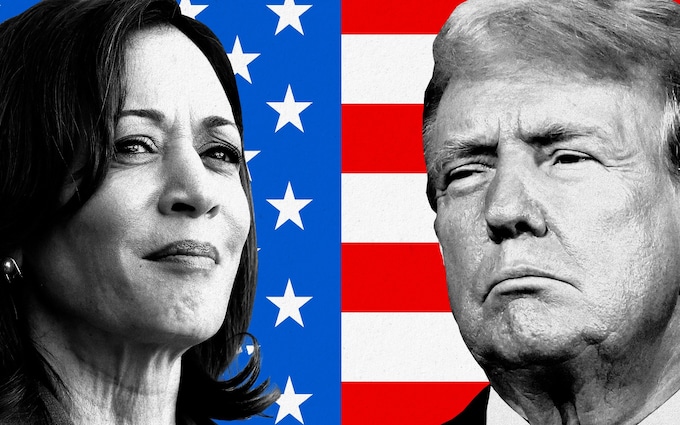The unpredictable and razor-close U.S. presidential election culminates on Tuesday with voters across the deeply divided country deciding whether Kamala Harris or Donald Trump should be sent to the White House in January.
Harris, the sitting Democratic vice president, and Trump, the Republican former president who is seeking a second four-year term, spent the final frenetic weeks of the campaign making their case to voters in the seven critical states that are likely to decide the winner.
Pollsters say neither of the candidates in the battleground states – Pennsylvania, Michigan, Wisconsin, Georgia, North Carolina, Nevada, and Arizona – has a meaningful statistical lead, amplifying the sky-high uncertainty as the race hurtles to the finish line.
Either Trump or Harris could still comfortably win if the polls are off and several of these states are won by one or the other candidate.
But legal and political analysts warn there is a high likelihood that it could be days, or even weeks, before the next president is known if exceedingly tight races become mired in ballot recounts and legal fights.
Leaders around the world, not least in Europe, will be watching carefully.
The U.S. presidential election has an immense impact globally, with the United States playing a key role when it comes to international hotspots such as Ukraine, the Middle East, and Taiwan, as well as in influential bodies such as the NATO military alliance.
Fears of “election-related violence are not idle speculation,” wrote the International Crisis Group’s Michael Wahid Hanna in a recent briefing, citing the January 6, 2021 attack on the U.S. Capitol by Trump supporters trying to disrupt the certification of President Joe Biden’s win in the last election.
“It remains possible that Trump will encourage supporters to sow chaos around vote counting and certification processes, thus attempting to call the results into question and create a pretext for extraordinary procedures to resolve a disputed election in his favour,” he wrote.
Trump himself was targeted in two failed assassination attempts.
A shooter at a July campaign rally in Pennsylvania left Trump bloodied but not seriously injured after a bullet grazed his ear.
Weeks later, a man was found lurking with a rifle in the bushes of Trump’s Florida golf course as the former president played a game.
Harris, a black and Indian American, made abortion rights and cost of living concerns the centrepieces of her campaign.
But the former prosecutor and senator also focussed on the threat she says Trump – who was found guilty in a criminal hush-money trial in May – poses to democracy.
She called him a “petty tyrant” who is “out for unchecked power,” in a speech at the same site where Trump had rallied his supporters on the day of the Capitol riot.
Trump’s populist pitch to voters revolved around immigration, inflation and foreign policy, with promises to carry out mass deportations, impose across-the-board tariffs, roll back green energy initiatives and end the war in Ukraine “in 24 hours.”
His speeches were filled with personal insults to Harris, whom he described as “lazy” and “dumb as a rock.”
In one of his most inflammatory attacks, the former president falsely said she had misled voters about her racial identity.
“So I don’t know? Is she Indian or is she black?” he asked.
Harris, 60, has played down her race and gender. But if she succeeds, the daughter of an Indian-born mother and Jamaican-born father would become the first female president in the history of the United States.
Of the 45 men who have held the job, none have been of Asian descent and only one has been black.
A Trump victory would also be history-making.
Only one other president – Grover Cleveland in the late 19th century – has succeeded in winning non-consecutive terms.
The U.S. Constitution would prevent Trump from seeking a third term.
Another win for the 78-year-old real-estate tycoon, reality TV star and convicted felon would also make him the oldest person ever elected president.
Few would have expected the showdown between Trump and Harris a year ago.
Trump’s grave legal troubles, which include his efforts to subvert the results of the last election, had many convinced that the Republican Party would not line up again behind the twice-impeached former president.
But he easily knocked out his opponents in the party primaries to secure the nomination.
With President Joe Biden seeking re-election for the Democrats, a rerun of 2020 seemed locked in.
But in an unprecedented move, the 81-year-old dropped out of the race on July 21 following a disastrous debate performance against Trump that left Democrats in a panic about their chances in November.
Democrats quickly coalesced around the vice president, a figure who most Americans told pollsters they knew little about.
But Harris generated enthusiasm among previously demoralised Democrats and she was able to close Biden’s poll deficit with Trump.
As Americans readied to go to the polls on Tuesday the contest was seen as a dead heat.
Around 240 million people are eligible to vote in the election, which will also decide the make-up of the two houses of Congress – the House of Representatives and the Senate.
Which party controls those will have a major impact on the policy agenda of the incoming president.
A wave of polling station openings will begin in the morning on the East Coast before moving across central and western states and ending in Alaska and Hawaii.
But Election Day is not what it used to be. More than 75 million Americans have already cast their ballots by post or in-person early voting.
That includes Biden, who voted in his home state of Delaware last month. (dpa/NAN)


